
Learn Problem Solving to Eliminate the Causes for Failures and Overload
Problem solving training for result-driven managers and functional specialists to effectively eliminate the root causes of variability, gaps, defects, frustrations, and stress., cases, when to use:.
- Frustration from never-ending fire-fighting
- Excessive defects, uncontrolled variability
- Stress from unhappy boss, customer, spouse
- Working too hard, too late, risking burnout
Clients, for whom:
- Department managers and team leaders
- Functional specialists, engineers, controllers
- Consultants and improvement champions
- Anyone struggling with too many problems
Process, how it works:
- Online training course with personal coaching
- Apply 5 shifts to successfully address any problem
- Eliminate causes at physical, human, system root
- Learn proven strategies; practical templates included
Benefits, what to gain:
- Status and recognition as expert problem solver
- Become indispensable to the organization
- Free time to spend with family, friends, hobby
- Strategy for better pay and career advancement
Course Content - What You Will Learn
- Systematically solve safety, quality, reliability issues
- Define issue statements based on data, observations
- Learn proven tools and techniques to tackle deviations
- Use basic PDCA and 5-Why analysis for simple issues
- Use Causal Factor Analysis (CFA) for disasters, accidents
- Use Fault Tree Analysis (FTA) for rule-based problems
- Identify cause-effect relationships between factors
- Provide evidence to confirm or reject assumptions
- Drill down causes at the physical, human, latent root
- Develop actions to remove, reduce, control causes
Why Did the Titanic Sink?
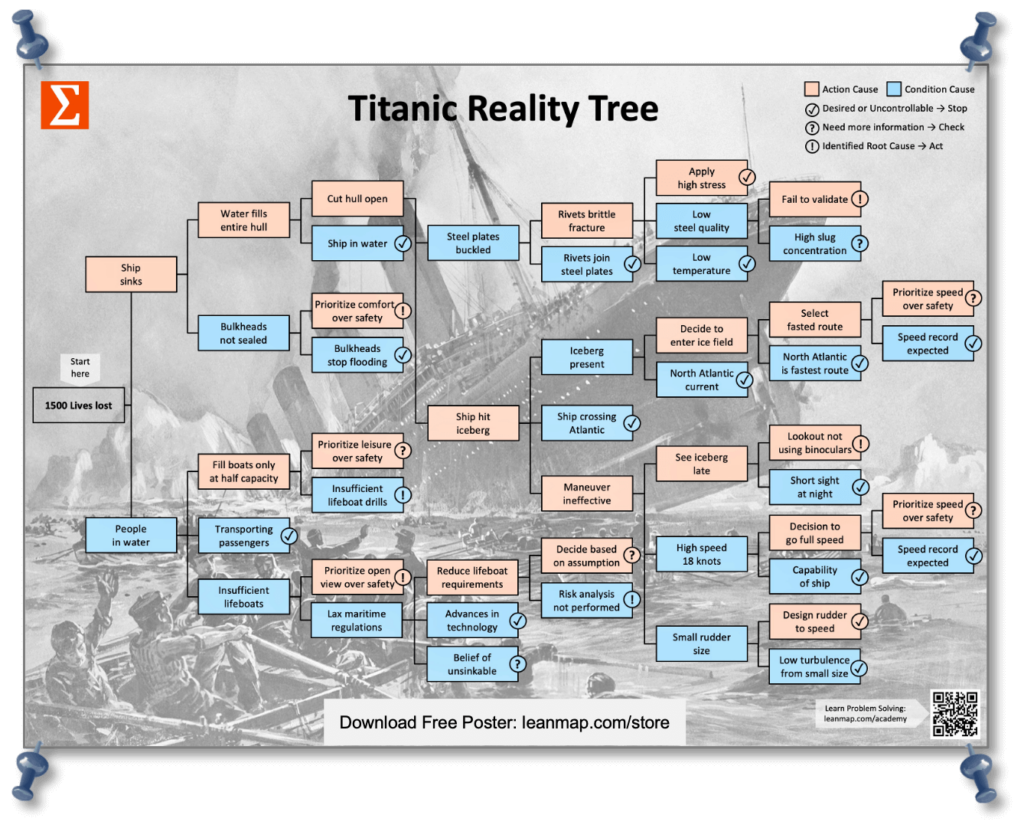
The 13 Reasons for Formal Problem Solving
- Undesirable condition
- Deviation, defect, failure
- Safety accident, incident, major risk
- Product failure due to strength, performance, reliability
- Line stop event
- Regulatory non-compliance
- Customer dissatisfaction or request
- Cost overrun
- Equipment breakdown
- Process failure
- Behavioral issue, noncompliant, disengaged
- Repetitive or transferable problem
- Detection failure
Ineffective Trouble Shooting
- Fire fighting
- Going from crisis to crisis
- Stagnant or declining performance
- No time for deeper analysis
- Look for the guilty party: ”Who did that?”
- Jumping from problem into actions
- Generate laundry list of actions to firefight symptoms
- Sub-optimizing one area, spot scope
- Focus on lagging metrics (yield, sales, profits) and hope processes will improve as a result
Effective Problem Solving

- Systems thinking
- Continuous improvement
- Systematic root cause elimination
- Better performance after each problem
- Allocate time to analyze, dialogue, conclude
- Seek deep understanding: “How did that happen?”
- Acting after understanding cause-effect relationships
- Addressing all factors of the failure tree
- Optimizing the value stream, enterprise scope
- Focus on improving processes (capability) that effect actual performance metrics
The Problem Solving Training Gets You Certified
The Beginner Problem Solving Training helps anyone to get started with systematic problem solving. Within a few days, you will learn the basic methods and tools, and apply them to solve a difficult situation in five steps: (1) Describe Gap, (2) Analyze Issues, (3) Identify Causes, (4) Address Causes, (5) Evaluate Results. Quizzes and self-evaluation forms help you to test your skills and evaluate solution the effectiveness of your solutions.
The Advanced Problem Solving Training is for managers, supervisors, and functional specialists to build their their problem-solving skills. The course focuses on systematic root-cause analysis and developing countermeasures to effectively contain, correct, and prevent failures from reoccurring. The advanced course is supported by a coach, helping students through the process, while providing feedback to get the analysis right.
The Expert Problem Solving Training is for engineers, managers, and quality professionals to build expert skills in systematic problem solving. The course covers the deep analysis of event-based problems, rule-based problems and human failures. The expert toolkit allows you tackling deviations and defects at the system level by eliminating, reducing, and controlling the entire set of causes, identified on the logic tree – assisted by an experienced coach.

Problem Solver | Basic Skills
Online course for beginners to build foundational skills to identify, describe, contain, correct, and prevent simple problems from reoccurring.
Problem Solver | Advanced Skills
Coaching-supported advanced course to strengthen problem-solving skills, to deeply analyze and effectively address identified root causes.

Problem Solver | Expert Skills
Coaching-supported expert course to solve complex problems by systematically reducing, eliminating, or controlling direct causes and root causes.
Basic Problem Solver
- 100% online and self-certified, without coaching
- Build basic skills in systematic problem solving
- Ideal for beginners from any function, any level
- Formally analyze and solve a basic problem
- Takes 2-5 days effort during a 1-month period
- Get access to basic videos, templates, toolkit
- Apply multi-5-why to identify root causes
- Formally implement a solution using PDCA
- Create financial benefits; typ. $3k or more
- Get your certificate "Problem Solver"
Advanced Problem Solver
- Coaching sessions for business case and impact
- Build advanced skills in problem-solving
- Ideal for managers, supervisors, specialists
- Solve an advanced problem and get feedback
- Takes 5-10 days effort during a 2-month period
- Get access to advanced videos, templates, tools
- Perform root cause analysis and test robustness
- Formally implement solutions, test effectiveness
- Create financial benefits; typ. $30k or more
- Get your certificate "Advanced Problem Solver"
Expert Problem Solver
- Coaching sessions, expert validation, live support
- Build expert skills in systematic problem solving
- For engineers. managers, quality professionals
- Solve a major problem, supported by a coach
- Takes 10-20 days effort during a 3-month period
- Get access to expert videos, templates, toolkit
- Identify physical, human, and latent causes
- Formally eliminate, reduce, control causes
- Create financial benefits; typ. $60k or more
- Get your certificate "Expert Problem Solver"
- What is Lean?
- Our Approach To Lean
- History & What We’ve Done
- Lean Research
- About Capability Development
- Login / Sign up
Sign up and join the community
Email address *
Subscribe to our newsletter
Please select all the ways you would like to hear from us Email
Your personal data will be used to support your experience throughout this website, to manage access to your account, and for other purposes described in our privacy policy .
Home > Learn Lean > Learn A3 8 Step Practical Problem Solving
Learn A3 8 Step Practical Problem Solving
What is a3 8 step practical problem solving.
A3 8 Step Practical Problem Solving (PPS) is a structured and effective problem-solving process used by individuals and teams to solve challenging, medium term, business and operational problems, originally pioneered by Toyota. Learn about the 8-step process, including clarifying the problem, containment, analysing & breaking it down, target setting, analysing the root cause(s), developing & planning countermeasures, confirming the results and standardising & sharing. Improve your problem-solving skills, preventing the reoccurrence of issues whilst improving results by applying the A3 8 Step Practical Problem Solving (PPS) process.
A3 8 Step Practical Problem Solving – Skill Level 1: Knowledge
This is a self-paced 2 hour course that is hosted on our online Learning Platform . By completeting this course you will gain the basic Purpose, Process and People knowledge about A3 Practical Problem Solving.
A3 8 Step Practical Problem Solving – Skill Level 2: Understanding
– 12 Hours Online, On-Demand, Self Paced Learning
– Purpose, Process, People & Method of Practical Problem Solving
– Teach Poster, 31 Teach Videos, A3 Case Study and Evaluation Method
– Learning Confirmation & Certificate of Completion
A3 8 Step Practical Problem Solving – Skill Level 3: Capable
This is an on-the-job coached course where a Senior Lean Coach will help you to become Capable in A3 8 Step Practical Problem Solving. Available online or face-to-face.
A3 8 Step Practical Problem Solving – Skill Level 4: Teach & Coach Others
Want to access all our online courses and webinars all in one place? Starting at just £99.99+VAT/year, our Learning Platform Subscription provides all current and future materials developed by the Lean Enterprise Academy. Click on the subscription logo to find out more information.
Supporting Materials
A3 problem solving: on-demand webinar.
This is a video recording of our A3 Problem Solving webinar. Included is access to a video of the webinar, a copy of the presentation slides, a transcript of the webinar, our Lean A3 Problem Solving Teach Poster presented during the webinar.

Toyota Practical Problem Solving (PPS)—Introduction
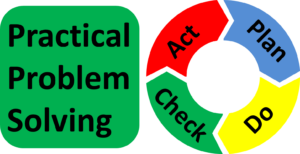
The Framework: PDCA
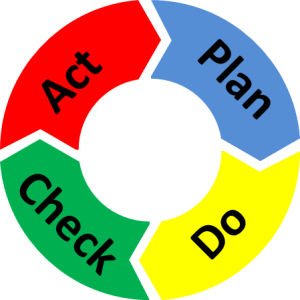
- Plan is to identify and clarify the problem, including collecting data to understand the problem, setting a target, and doing a root-cause analysis.
- Do is the development and implementation of countermeasures.
- Check verifies whether these countermeasures were effective and the target has been reached.
- Act is to re-do and further improve if the targets have not been met (yet). If it was successful, the Act part looks for other locations and applications where this solution could be used (e.g., if it was a smaller trial to be rolled out on a larger scale). Toyota also shares these yokoten on an internal website with other plants.

Toyota practical problem solving consists of the steps as listed below. Note that sometimes you have a step more if you decide to split a step into two.
- Clarify the Problem
- Break Down the Problem
- Set a Target
- Root-Cause Analysis
- Develop Countermeasures and Implement
- Monitor Process and Results
- Standardize and Share
I will explain all these steps in much more detail, including the risks and difficulties, throughout this small series of posts. But before explaining these steps in detail, let me also show you the structure.
The Structure: A3
You probably know the structure already, or at least have heard of it: it is the famous A3 . This report, named after the standard A3 paper size, is commonly used at Toyota to tackle medium-sized problems. The A3 format was chosen because it was a good compromise between getting lots of data on a single page and also having a page small enough to be carried around on the shop floor. (And, as legend has it, A3 was supposedly the largest format to fit though a fax machine back in the day).
You will find all the steps from above again in this A3 format, an example of which is shown below, plus the obligatory header row with organizational data like title, date, and so on.
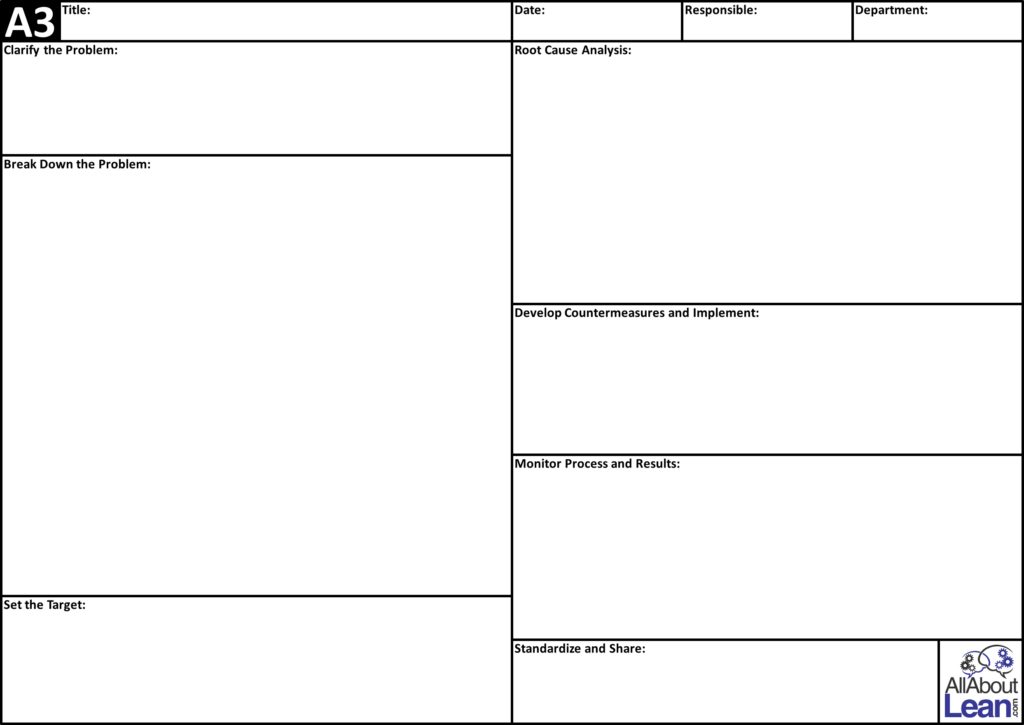
The A3 is intended to be filled out in pencil (not pen), which makes changing content easy by using an eraser. Nowadays digital tools are also often used, although Toyota still does this mostly by hand using pencil on paper. Digital A3s are easier to share and look prettier, but they are harder to make and much more effort is needed in creating the A3. If you have ever created an A3 in Microsoft Excel, you know what I am talking about (as Excel is wholly unsuited for such graphical work…Ugh!)
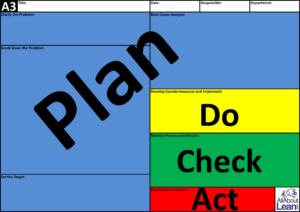
The “Do” part is actually quite small. If you understand the problem well, the solutions are rather easy. If you don’t understand the problem, you still may have a solution, but it will probably be an inferior one, if it works at all. Similarly, the Check and Act are also rather small.
In my experience, this is often done differently (and in my opinion worse) in many other Western companies. The focus is all on doing something, implementing some sort of solution. There is a bit of planning, but the vast majority of the effort goes into the “Do” part. The “Check” and “Act” parts are quite underdeveloped, if they exist at all.
A fancy presentation often substitutes for “Check,” resulting in many supposedly successful projects that did not improve much or even made it worse. Below I compared the normal representation of the PDCA circle having four equal quadrants with a PDCA circle based on the effort by Japanese or Toyota standards, and another PDCA circle based on the effort of (way too many) Western companies. I’ll let you be the judge on how this is in your company.
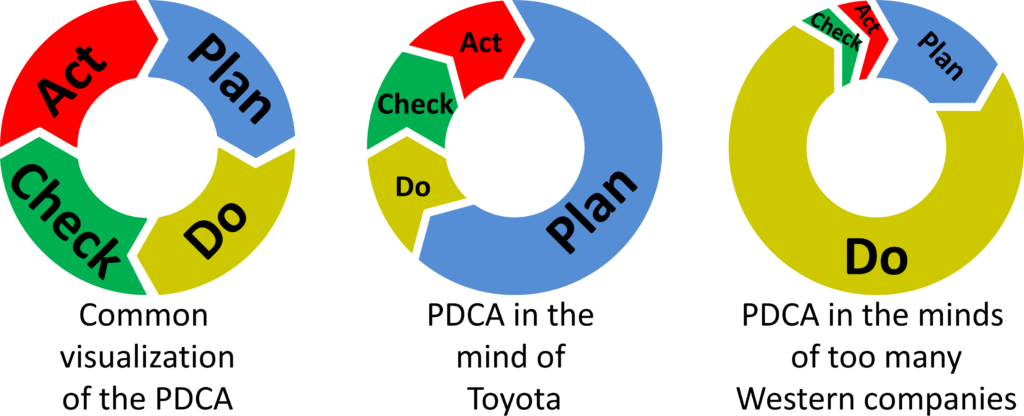
Over and over again I guide people through the practical problem-solving process, and at every single step they jump to a solution. Let’s take a (fictitious) example for the steps of the problem solving, where every step is going right for the solution, ignoring the initial purpose of the step:
- Clarify the Problem: Well, we need kanban!
- Break Down the Problem: Okay, how many kanban do we need?
- Set a Target: That’s how many kanban we need!
- Root-Cause Analysis: Um… we did this already. It’s the lack of kanban…
- Develop Countermeasures and Implement: Add kanban!
- Monitor Process and Results: Do we have kanban now? Yes, we do. Case closed.
- Standardize and Share: Hey, guys, use kanban!

PS: Many thanks to the team from the Toyota Lean Management Centre at the Toyota UK Deeside engine plant in Wales, where I participated in their 5-day course. This course gave us a lot of access to the Toyota shop floor, and we spent hours on the shop floor looking at processes. In my view, this the only generally accessible course by Toyota that gives such a level of shop floor involvement.
6 thoughts on “Toyota Practical Problem Solving (PPS)—Introduction”
Great ‘ Flow ‘ and easy to understand , specially for many who have limited exposure. Thanks
Thank you for sharing. PDCA is applicable on the shop floor, logistics, service industry – wherever Problems are accurately defined
Nice blog. I’m working in an NHS Production System (NHSps) design based on the Toyota and VMI Production Systems. Do you have any experience in this area?
Hi Tom, sorry, I am completely unfamiliar with the NHS production system. if you mean the National Health Service in the UK, I do have a bit of experience with lean Hospital.
Might I suggest a dry erase marker and a whiteboard? After a few times when the document structure is mostly stable, you can add lines with a permanent marker to fix the format in place. That way you’re not creating extra friction for the process.
As for actual A3, that works best when the A3 paper and printers that can print it are already readily available. I’m sure you ran across more than one business where just about every single printer on site can’t print anything larger than A4 or A3 paper simply isn’t available due to A4 used for everything.
Hi Andrey, I am a great fan of erasable notes, and use dry erase whiteboard markers a lot myself. An A3 printer is also really helpful, but just as you said, not every (small) business has one. For example, I only have an A4 printer in my office…
Leave a Comment
Notify me of new posts by email.
Lean 6 Sigma
independent and full service business development and management consulting partner
Practical Problem Solving Training
Course overview.
Practical Problem Solving (PPS) is the core of solving problem of any organization. This PPS should be implemented and done all teams of the organization almost on daily bases or when they encounter any problem in their area. Teams should possess the capability of solving problem and reach by reaching root cause of the problem.
This is a proactive and prevention technique that will help individuals and teams in preventing problem and reducing firefighting. The candidate will be able to use PPS technique and tools and how to facilitate PPS session in the most effective, efficient and professional way.
What you’ll learn
- You will develop the attitudes and habits of team problem-solving that produce performance improvement.
- You will learn three models of problem-solving associated with Toyota Production System or “lean management.”
- You will learn and apply a simple and direct approach to root cause analysis and situation analysis.
- You will develop and practice the skills of brainstorming and consensus reaching.
- You will practice a simple and effective model of action planning and follow through that is critical to achieving results.
Program Methodology
The training program methodology is a combination of training lectures, examples, Videos and exercises. Course Duration: One full day
Click one of our representatives below to chat on WhatsApp or send us an email to [email protected]
Powered by WhatsApp Chat
Alison's New App is now available on iOS and Android! Download Now
Do you represent a business or organization that would like to train and upskill their employees?
If yes, check out Alison’s Free LMS here!
header.all_certificate_courses
Personal development, sales & marketing, engineering & construction, teaching & academics.
Become an Alison Affiliate in one click, and start earning money by sharing any page on the Alison website.
- Change Language

Turn Your Thinking Around: New Approaches to Problem-Solving
This free online course includes:.
- Hours of Learning
- CPD Accreditation
- Final Assessment
Rate This Course & Get Better Recommendations!
Thanks for your review, in this free course, you will learn how to.
Problem-solving refers to a person’s ability to successfully manage and find solutions for complex and unexpected situations in our daily life and workplace. The ability to solve simple and complex problems every day is essential to individuals and organizations. Employees with strong problem-solving skills often rise through the ranks quickly in organizations. This insightful free online course will teach you new problem-solving tools to solve problems efficiently and effectively. You will start by learning about the Copernican Revolution to develop a new way of thinking, find out why problem-solving efforts fail and study the principles of creative thinking.
Next, you will discover new problem-solving tools like the higher-level view and word association to enhance the skills of any problem-solving team. You will then learn to review processes in an organization, using a process map to identify areas for process improvement. Delve deeper into the root cause analysis of a problem to find better solutions. Learn to uncover the stages in problem-solving tools that work best with each of them, how to organize an effective problem-solving team and how to quantify the benefits of problem-solving.
Problem-solving skills are universally sought-after by employers. Many businesses rely on their employees to identify and effectively solve business problems. Without problem-solving skills, you spend time worrying about what you will do in case of a problem, and you may make decisions that have negative consequences on the organization. This course will teach you in-demand skills that will give you a competitive edge and make a big difference in your career and personal life. Anyone who wants to become proficient in problem-solving will find this course beneficial. Start learning today and become an effective problem-solver!
All Alison courses are free to enrol study and complete. To successfully complete this course and become an Alison Graduate, you need to achieve 80% or higher in each course assessment. Once you have completed this course, you have the option to acquire an official Diploma, which is a great way to share your achievement with the world.
Your Alison is:
- Ideal for sharing with potential employers
- Great for your CV, professional social media profiles and job applications.
- An indication of your commitment to continuously learn, upskill & achieve high results.
- An incentive for you to continue empowering yourself through lifelong learning.
Alison offers 3 types of Diplomas for completed Diploma courses:
- Digital : a downloadable in PDF format immediately available to you when you complete your purchase.
- : a physical version of your officially branded and security-marked , posted to you with FREE shipping.
- Framed : a physical version of your officially branded and security marked in a stylish frame, posted to you with FREE shipping.

All s are available to purchase through the Alison Shop . For more information on purchasing Alison , please visit our FAQs . If you decide not to purchase your Alison , you can still demonstrate your achievement by sharing your Learner Record or Learner Achievement Verification, both of which are accessible from your Account Settings . For more details on our pricing, please visit our Pricing Page
Knowledge & Skills You Will Learn
Complete this cpd accredited course & get your certificate , certify your skills, stand out from the crowd, advance in your career.

Learner Reviews & Feedback For Turn Your Thinking Around: New Approaches to Problem-Solving
Want to create a customised learning path for your team.
Our dedicated Learning Advisors are here to help you curate a customised learning path tailored to your organisation's needs and goals.
Explore Careers Related To This Course
Not sure where to begin or even what you want to do.
Discover the career most suitable for you and get started in the field with a step-by-step plan.
About Your Alison Course Publisher
- alison stats, more free online courses by this publisher, learners who took this course also enrolled in, explore subjects related to this course.
Join our community of 40 million+ learners, upskill with CPD UK accredited courses, explore career development tools and psychometrics - all for free.
- Reset password form here
- Training & Events
Practical Problem Solving Training
Practical problem solving course overview.
Many companies seek to improve their business using various continuous improvement methodologies including Lean principles. The proven method for deploying these concepts is to tie them into an overall strategy of business improvement. This leads to the highest rate of return on investment over the long term along with ensuring sustainability of a continuous improvement culture. As part of this overall strategy of continuous improvement is the use of the tool: Practical Problem Solving.
Course Objective
What makes this Lean tool unique is the straightforwardness of the application. By simply using the materials provided to you during the training, you will be able to step through the process to solve the problem knowing that each phase is completed. The worksheets can be used for communication of the problem and the follow up effectiveness within your organization. It can also be used to respond to customer complaints and be valid towards any formal complaint resolution procedure required by governing bodies.
The Catalyst Connection consultant will work with you to develop the skill sets essential to practical problem solving. The course involves applying the training by assigning a real life problem to be solved by your staff.
Participants will receive instruction on the following tools that are used in Practical Problem Solving:
- Problem Definition – How to properly define a problem and plan improvements
- Root Cause Analysis – Determine point of cause of defect(s) and find true root cause.
- Countermeasure Implementation – Communicate and execute short and long term countermeasures to eliminate problem(s) and adjust as needed to stay on target.
- Effectiveness and Standardization – Follow up on countermeasures and performance indicators of solution. Standardize effective countermeasure, leverage to other opportunities and take action to begin the problem solving process again.
Benefits of Practical Problem Solving
As a result of utilizing this approach to the Practical Problem Solving tools, companies report seeing reoccurring problems eliminated reduced costs, and a highly effective and engaged workforce. Additionally, this specific approach becomes the driving force behind sustaining your improvements and standardizing countermeasures.
The training will help you to answer questions around the following:
- Declining profit margins
- Difficulty controlling costs, poor levels of productivity
- High defect or scrap rates
- Low customer satisfaction
Additional benefits expected for all participants include the following:
- Problem solving is a process and skill set that you develop over time, to be used when the need to solve immediate problems in order to achieve goals
- An opportunity to transfer knowledge from the key participants of your team that will be responsible for maintaining this tool, to others in the organization
Similar Courses
Catalyst connection donates $2,500 to botsiq thanks to your feedback.
We are thrilled to announce that Catalyst Connection has donated $2,500 to BotsIQ, a nonprofit organization dedicated to inspiring…
Beaver County Manufacturers! Join Us as a Vendor at the Pathways Career Awareness Event
Come and be a part of the highly-anticipated Energy & Advanced Manufacturing Partnership's Pathways Career Awareness event on October…
Shape the Future of Workforce Advanced Technology Training Programs: Share Your Insights In Our Key Surveys
Our goal at Catalyst Connection is to assist small and medium-sized manufacturers in thriving and growing in an ever-changing…
- MEMBER LOG IN
- Call us on 0808 168 5874
- All training courses
- Virtual classroom
- Health, Safety & Sustainability
- HR & Legal
- Leadership & Management
- Technical Training
- Export Training
Practical problem solving training (8D method)
This one-day course provides a detailed understanding of a rapid, structured problem-solving process, which delivers long term solutions. Delegates will use linked tools and practical examples to become more familiar with the key stages of problem definition and solution. On completion of the course and after rolling out 8D problem solving, delegates' businesses would be expected to save time, money and resources by fixing recurring problems. The training programme is relevant to anybody responsible for solving real world problems, or those in operations, technical and project supervisor roles.
- Course content
- Problem definition – developing a problem statement
- Cause and effect analysis - brainstorming, fishbone diagrams, the 5 whys
- Containment actions – taking immediate action to prevent the problem from affecting the customer
- Root cause identification - corrective action, implementation and preventing recurrence.
- Pre-requisites
There are no prerequisites for this course.
No assessment, but delegates receive a certificate of completion.
- More details
By completing this course, delegates will:
- Work through a structured problem-solving process
- Clearly define the problem
- Clearly define the root cause of the problem
- Develop and implement corrective actions.


Shopping Cart
No products in the cart.

Teaching Adult Learners
If you teach adults, or plan to as you develop in your career, learn how to teach adults, as adults. Light on theory and heavy on practical guidance and problem solving, Teaching Adult Learners will guide you in identifying, applying, and problem-solving implementations of principles of Malcolm Knowles’s theory of adult learning and of Heutagogy, the theory and practice of self-determined learning.
You’ll learn by interacting with scenarios teaching and instructional typically encounter–a single session introduction to library services workshop, an online course, and a face-to-face course.
The course includes:
- Realistic scenarios that you interact with to learn and practice skills
- Self-assessment of skills, pre and post
- Recommended readings & resources
- Supplemental resources and tips
Learning Outcomes
After you have completed the course, you will be able to:
- Select andragogical and heutagogical strategies appropriate to an audience, format, and outcomes
- Implement instructional andragogical and heutagogical strategies
- Address problems in the implementation of andragogical and heutagogical interventions
Health Sciences librarians that teach or plan to teach adults in academic or hospital settings. Teaching experience is helpful but not necessary.
MLA CE Credits 1.5
Illinois CNE Credits 1.5
Subject Matter Expert

Lauren Hays , PhD, is an Assistant Professor of Instructional Technology at the University of Central Missouri. Previously, she was the Instructional and Research Librarian at MidAmerica Nazarene University in Olathe, KS. She is a co-editor of The Grounded Instruction Librarian: Participating in The Scholarship of Teaching and Learning and the author or coauthor on a number of articles on teaching and learning.
The team that created Teaching Adult Learners:
Lauren Hays, Subject Matter Expert
Jeanne Bernui, Instructional Designer
Shenita Peterson, MLA Instruction & Instructional Design Curriculum Committee Representative
Staff support:
Deb Cavanaugh, MLA Director, Professional Development
Barry Grant, MLA Director, Education
Course Content

Course Includes
- Course Certificate
Email Address
Remember Me
Registration confirmation will be emailed to you.
Practical Problem Solving with Algorithms

Kyle Simpson

Course Description
You’ve likely taken several algorithms and data structures courses and know the “what”, and now it’s time to put the knowledge to practice! Develop better problem-solving skills by thinking through challenges and applying various algorithms and computer science techniques. Use recursion, traversals, acyclic paths, memoization, and garbage collection to optimize your solutions and think like a true algorithmist.
This course and others like it are available as part of our Frontend Masters video subscription.
Course Details
- Learning Paths
- Computer Science
- computer-science
Learn Straight from the Experts Who Shape the Modern Web
- 200+ In-depth courses
- 18 Learning Paths
- Industry Leading Experts
- Live Interactive Workshops
Table of Contents
Introduction.

Course Overview

Data Structures Overview

Algorithms & Techniques Overview

Golden Weighted Ball Problem
Example problems.

Packing Algorithms & Collision Detection

Tetris, Puzzles, & Size Comparison
Periodic table speller.

Periodic Table Speller Setup

Lookup Function

Check Function: Recursion

Check Function: Base Case

Optimizing the Lookup Function

Finding Candidates

spellWord Function with Character Sets

spellWord Function Q&A

Performance Characteristics
Chessboard diagonals.

Drawing the Chessboard

Traversing the Tiles

Highlighting Diagonal Tiles

Optimizing DOM Traversal

Using Two-Dimensional Arrays

Creating a Diagonal Data Structure

Refactoring the Highlight Function
Knight's dialer.

Knights Dialer Exercise

Reachable Keys Function

Optimizing with a Data Structure

Recursive Traversal

Big O Complexity

Acyclic Paths

Optimize Recursion with Memoization

Dynamic Programming Overview

Visualizing Dynamic Programming

Coding with Dynamic Programming
Wordy problem.

Wordy Unscrambler Overview

Wordy Unscrambler Algorithm

Divide & Conquer Solution

Trie Tree Data Structure

Finding Words in a Trie Tree

Garbage Collection & Object Pool

Implement an Object Pool

Directed Acyclic Word Graph Overview

Implementing a DAWG Data Structure
Wrapping up.

- In-depth Courses

COMMENTS
Practical Problem Solving is both a process and a skill that you develop over time to solve problems quickly and achieve goals. This process provides teams with a framework for solving problems, allowing them to quickly define, diagnose, and resolve issues. Additionally, because this process involves root cause analysis, follow-up, and ...
Practical Problem Solving. Practical Problem Solving (PPS) is a Lean methodology initially developed in the Toyota factory that expands on the PDCA cycle (Plan, Do, Check, Act) and turns problem-solving into a systematic eight-step process. Practical Problem Solving allows organizations to estab ...
https://gembaacademy.com | The Gemba Academy Practical Problem Solving course explains the exact 8 step problem solving process used by these lean exemplars around the world.
What is A3 Problem Solving? Practical problem solving helps establish a common understanding of problems, removes time wasted in debates and discussions and enables organizations to focus on solving problems. It ensures problems don't reoccur.
Objective: This A3 8 Step Practical Problem Solving - Skill Level 1 course will give you basic Knowledge about the Background, Purpose, Process & People of the A3 8 Step Practical Problem Solving method.
Learn how to solve problems and make decisions effectively with this course from UC Irvine. You will gain practical tools and strategies to enhance your creativity and critical thinking.
An overview of the 8 steps to Practical Problem Solving.
Our problem solving courses build practical skills to become more effective, achieving better results by systematically eliminating, reducing, and/or controlling causes at the physical, human, and latent root.
Designed for busy professionals, Practical Problem Solving offers proven tips and techniques for solving real business problems. This interactive course uses a case study approach to introduce various tools and techniques to answer key questions: What is the specific business problem you are trying to solve?
Description Welcome to our Psychology-based Practical Problem Solving & Decision Making Training course, where you will learn a comprehensive and practical guide to effective problem-solving and decision-making in both your personal and business life.
Learn Problem Solving today: find your Problem Solving online course on Udemy
Workbook. PPS Overview. An overview of the 8 steps to Practical Problem Solving. A workbook intended to accompany the Facilitator's Guides for this course. This guide includes the Key Points from the video, discussion items, quiz questions, and helpful tips. Using Gemba Academy's online learning content, any participant can use this ...
Explore top courses and programs in Problem Solving. Enhance your skills with expert-led lessons from industry leaders. Start your learning journey today!
A3 8 Step Practical Problem Solving (PPS) is a structured and effective problem-solving process used by individuals and teams to solve challenging, medium term, business and operational problems, originally pioneered by Toyota. Learn about the 8-step process, including clarifying the problem, containment, analysing & breaking it down, target ...
Lean is a lot of problem solving. Toyota excels at such problem solving, and they have developed their practical problem solving (PPS) approach. For many it is surprising how much time Toyota spends on defining and understanding the problem, whereas (many in) the rest of the world immediately jump to a (possibly inferior) solution. Let me go through the process step by step.
A step by step guide to presenting Gemba Academy's 5S course to lean learners in all positions. This guide includes key points, discussion items, quiz questions and answers, and helpful tips. Using Gemba Academy's online learning content, any facilitator can teach teams of people to solve problems quickly and efficiently.
Course Overview Practical Problem Solving (PPS) is the core of solving problem of any organization. This PPS should be implemented and done all teams of the organization almost on daily bases or when they encounter any problem in their area. Teams should possess the capability of solving problem and reach by reaching root cause of the problem.
By the end of this course you will have learned and memorized a practical model to solve problems on your own and with others. These 7 critical steps will ensure that you have looked at a problem from every angle and considered multiple solutions. In fact, this dynamic and holistic approach will help you solve problems once and for all!
Discover new problem-solving tools you can use in all kinds of situations and how to organize an effective problem-solving team with this free online course.
Practical Problem Solving Course Overview Many companies seek to improve their business using various continuous improvement methodologies including Lean principles. The proven method for deploying these concepts is to tie them into an overall strategy of business improvement. This leads to the highest rate of return on investment over the long term along with ensuring sustainability of a ...
Learn how to utilize the Practical Problem Solving Method: 8-Step Problem Solving in conjunction with strategic planning tools to solve problems. Utilize a structured critical thinking model to address problems. Attain lasting results by using sustainment tools. Gain in-depth knowledge to identify and resolve root causes instead of simply ...
Practical problem solving training (8D method) Review us on. This one-day course provides a detailed understanding of a rapid, structured problem-solving process, which delivers long term solutions. Delegates will use linked tools and practical examples to become more familiar with the key stages of problem definition and solution.
Light on theory and heavy on practical guidance and problem solving, Teaching Adult Learners will guide you in identifying, applying, and problem-solving implementations of principles of Malcolm Knowles's theory of adult learning and of Heutagogy, the theory and practice of self-determined learning.
Course Description You've likely taken several algorithms and data structures courses and know the "what", and now it's time to put the knowledge to practice! Develop better problem-solving skills by thinking through challenges and applying various algorithms and computer science techniques. Use recursion, traversals, acyclic paths, memoization, and garbage collection to optimize your ...
DL is a form of advanced learning geared towards problem solving. Practical participation based on problem solving can promote the interactive operation between individuals and knowledge, deepen learners' application and understanding of abstract concepts, and enable students to realise the transfer of knowledge between disciplines and to ...